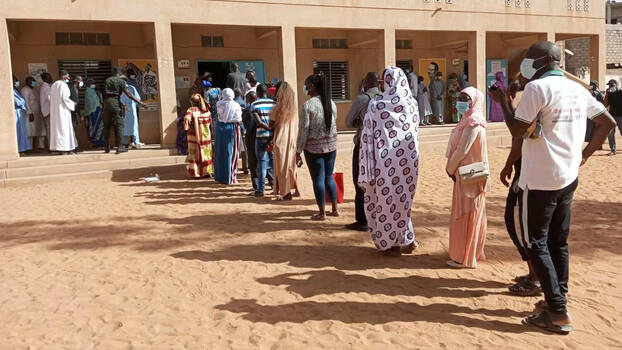
Local elections took place throughout Senegal on 23 January — finally, as some probably said. After all, the last local elections in Senegal were held in 2014. Normally, new elections should have been organized after five years, but for various reasons invoked by the government, they were postponed several times.
Bruno Sonko works as a project manager in the Rosa Luxemburg Foundation’s West Africa Office in Dakar, Senegal.
Some 6.6 million voters were called to elect mayors and departmental councillors, choosing between 3,149 lists in total across 557 towns or cities and 43 departments. It marked the first vote since the re-election of Macky Sall in 2019, not to mention the violent riots of March 2021 which left 13 dead. Many observers of the Senegalese political scene viewed the elections as a life-size test of the solidity and popularity of the country’s various coalitions and political leaders. Yet the vote was also marked by another novelty: for the first time, mayors were elected by universal suffrage.
Measuring the Campaign
The electoral campaign was sometimes punctuated by rather violent incidents involving the many political parties seeking to win majorities the localities. Clashes were reported between activists of the various candidates in both Dakar as well as elsewhere in Senegal, but generally speaking, they did not significantly affect the organization and conduct of the voting process. In other words, the population was able to vote without great difficulty, as confirmed by observers mandated by civil society.
The local elections made it possible to gain a more or less concrete idea of the real state of the political forces in the country, divided as they are between, on the one hand, the presidential coalition Benno Bokk Yakaar (BBY) and its political allies, and, on the other, the opposition and a slew of political parties or coalitions including Yewwi Askan Wi (YAW) of Ousmane Sonko, Barthelemy Diaz and Khalifa Sall, Guem sa Bop, Defar Senegal, Bunt-Bi, and more.
For the presidential coalition, as political analyst Barka Ba points out, the elections served as a “good barometer before the legislative elections to see if the grip of power on local communities will erode and undermine the omnipotence of the ruling coalition, whose driving force remains the APR, the Alliance for the Republic, the president's party.”
For the opposition and YAW in particular, the challenge was, as the newspaper l'Enquête described, one of weaving its web, testing the popularity of leaders such as Barthélemy Diaz, Ousmane Sonko, or Khalifa Sall, and setting the date for the legislative elections of June 2022 and the presidential election of 2024.
A Clear Verdict
The control of certain regional capitals (Dakar, Ziguinchor, Thiès, Saint-Louis, Diourbel, Kaolack in particular) remained crucial and therefore constituted a major challenge, both for the presidential party and for the opposition. Dakar is a perfect illustration of this, as it has escaped the control of the ruling party since 2009.
For the time being, the provisional results (which have yet to be validated by the National Electoral Commission and the Courts of Appeal) published in the Senegalese press show that the main regional capitals have been largely won over by the opposition, in particular YAW. Two regional capitals had thus raised many hopes in the presidential camp: Dakar and Ziguinchor. In Ziguinchor, Ousmane Sonko, leader of the PASTEF — Les Patriotes party, succeeded in defeating the outgoing mayor as well as the presidential coalition with a significant difference in votes. That same evening, he was congratulated by the representative of BBY, Benoit Sambou, and the mayor of Ziguinchor, Abdoulaye Balde.
In Dakar, where the main electoral battle took place and to which the presidential coalition had apparently devoted enormous financial resources, Barthelemy Diaz defeated the presidential coalition led by the Minister of Health, Abdoulaye Diouf Sarr. Similarly, Aliou Sall, brother of the President of the Republic and outgoing mayor of Guédiawaye in the suburbs of Dakar, acknowledged his defeat and congratulated the YAW coalition. Many political leaders of the ruling party, ministers and general managers of state-owned companies, were also defeated in Dakar and the major regional capitals by representatives of YAW or other opponents. Even Thiès, a large city 70 kilometres from Dakar and bastion of Idrissa Seck (main ally of President Macky Sall) for many years that was deemed impregnable, has been conquered by YAW. It should also be noted that young YAW candidates won many town halls.
The ruling party and the BBY coalition claimed victory in a press conference held on 25 January, particularly in the country’s rural areas, but acknowledging their failure is unthinkable for BBY, despite not succeeding in reconquering the large cities despite the colossal means deployed. The Senegalese opposition and its main leaders are obviously savouring a resounding victory, which bodes well for an encouraging political future — barring a major incident. As for the presidential coalition, it is high time to ask the right questions and explain the extent of its electoral defeat, especially since the legislative elections are already looming in June 2022.